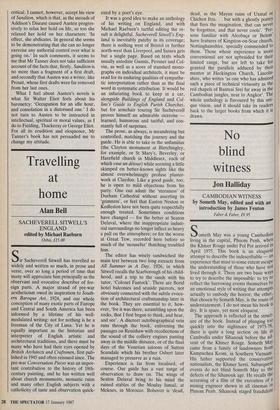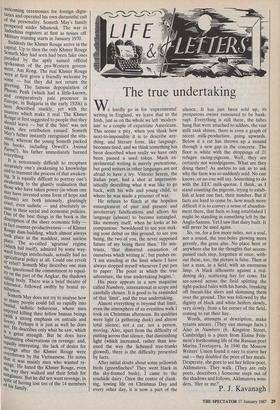No blind witness
Jon Halliday
CAMBODIAN WITNESS 6y Someth May, edited and with an introduction by James Fenton
Faber & Faber, f9.95
Someth May was a young Cambodian living in the capital, Phnom Penh, when the Khmer Rouge under Pol Pot arrived in April 1975. This book is an eloquent attempt to describe the indescribable — an experience that must to some extent escape the understanding of those who have not lived through it. There are two basic ways to try to describe the impossible: to try to reflect the harrowing events themselves by an emotional style of writing that attempts actually to embody the horror; the other, that chosen by Someth May, is the route of understatement. I do not mean his book is dry. It is spare, yet most eloquent. The approach is reflected in the struct- ure of the book. Instead of plunging too quickly into the nightmare of 1975-78, there is quite a long section on life 10 Cambodia under Sihanouk before the ad' vent of the Khmer Rouge. Someth MaY came from a family of landowners front Kampuchea Krom, in Southern Vietnam. His father supported the conservative nationalists, the Khmer Serei. Subsequent events do not blind Someth May to the defects of the Sihanouk age. He recalls the screening of a film of the execution of .a mining engineer shown in all cinemas 10 Phnom Penh. Sihanouk staged fraudulent welcoming ceremonies for foreign digni- taries and operated his own distasteful cult of the personality. Someth May's family prospered under Sihanouk. The war in Indochina registers at first as noises off. Military training starts in January 1970. Suddenly the Khmer Rouge arrive in the capital. Up to then the only Khmer Rouge Someth May had seen had been fake ones paraded by the aptly named official spokesman of the pro-Western govern- ment, Am Rong. The real Khmer Rouge were at first given a friendly welcome by some — but they did not return the greeting. The famous depopulation of Phnom Penh (which had a little-known, and comparatively pale precursor in Europe, in Bulgaria in the early 1920s) is here described starkly, yet with the nuances which make it real. The Khmer Rouge at first suggested to people that they should leave — but if the 'hint' was not taken, dire retribution ensued. Someth May's father instantly recognised the situ- ation; whereas the young Someth packed his books, including Orwell's Animal F.ann(!), his father immediately burned everything. It is notoriously difficult to recapture accurately one's awakening to knowledge and to transmit the process of that awaken- ing. It is equally difficult to portray one's awakening to the ghastly realisation that those who have taken power (in whom one may have invested some form of hope and dreams) are both intensely, gloatingly cruel, even sadistic — and absolutely in- sane in their social and economic policies. One of the best things in the book is the d. escription of the sheer economic folly — In fact counter-productiveness -- of Khmer took dam-building, which almost always Look place in the maddest, most useless Place. The so-called 'agrarian' regime (which hid itself), admired by some way- ward foreign intellectuals, actually had no agricultural policy at all. Could one revolt or rebel? Someth May describes one man who questioned the commitment to equal- ItY on the part of the Angkar, the shadowy ruling body. There was a brief theatre of tolerance followed swiftly by brutal re- tribution. Someth May does not try to analyse how inanY people could fall so rapidlyre into oestial, sadistic behaviour, whe men enjoyed killing their fellow human beings (with a strong emphasis on entrails and vets). Perhaps it is just as well he does !nn. He describes only what he saw, which Is a great strength. But he does have fascinating observations on revenge: and, equally interesting, the lack of desire for o�enge after the Khmer Rouge were erthrown by the Vietnamese. He notes that it was mainly men who wanted re- venge. He hated the Khmer Rouge, even sue Way they walked and their fetish for sglasses. But he did not want revenge, in Pite of having lost ten of the 14 members e'f his family.











































 Previous page
Previous page